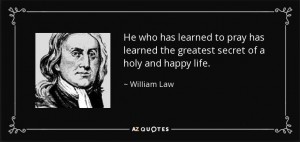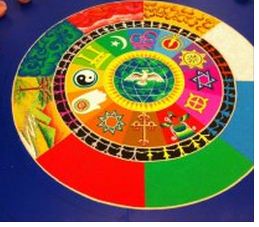The Third Hour of the Day
9:00 AM
Subject of the Third Hour of the Day Devotion: Humility
“Humility does not consist in having a worse opinion of ourselves than we deserve, or in abasing ourselves lower than we really are; but as all virtue is founded in truth, so humility is founded in a true and just sense of our weakness, misery, and sin. He that rightly feels and lives in this sense of his condition, lives in humility.”
~Excerpt taken from A Serious Call to a Devout and Holy Life by William Law.
“Open thou mine eyes, that I may behold wondrous things out of thy law.” ~Psalm 119:18
“In order to keep God’s word, must we not pray to understand it? What then is prayer? Not—give me a plainer Bible—but open mine eyes to know my Bible. Not—show me some new revelations beside the law—but make me behold the wonders of the law. David had acquired in the Divine school “more understanding than all his teachers” (Verses 99,100); yet he ever comes to his God under a deep sense of his blindness. Indeed those who have been best and longest taught, are always the most ready to “sit at the feet of Jesus” (Luke, x. 39), as if they had everything to learn.”
“But do not even Christians often find the word of God to be as a sealed book? They go through their accustomed portion, without gaining any increasing acquaintance with its light, life, and power, and without any distinct application of its contents to their hearts. And thus it must be, whenever reading has been unaccompanied with prayer for Divine influence. For we not only need to have our “eyes opened to behold” fresh wonders, but also to give a more spiritual and transforming (2 Cor.iii.18) perception of those wonders, which we have already beheld.”
~Excerpt from An Exposition of Psalm 119 by Charles Bridges, republished by The Banner of Truth Trust, 1995. First published in 1827.

